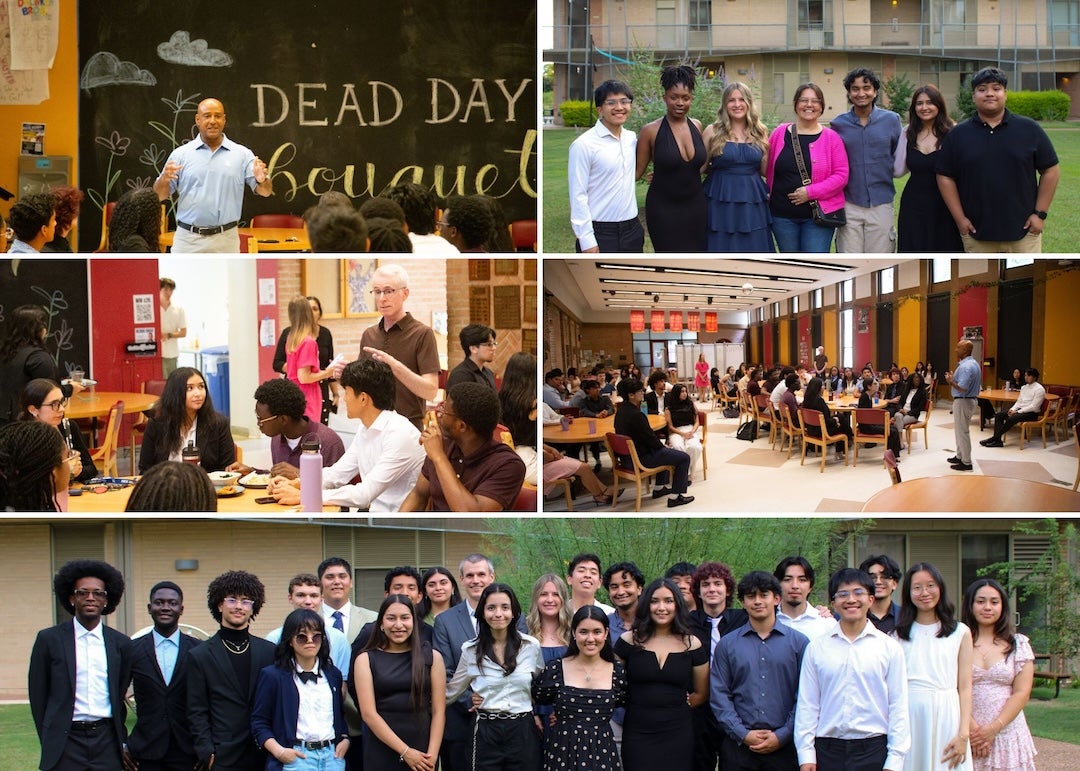
⎯ By John Bogna and Raji Natarajan
Special to Rice News
Rice University’s campus was buzzing this summer as students in the Rice Emerging Scholars Program (RESP) wrapped up six weeks of challenging courses, hands-on projects and community-building. The end-of-program events and presentations marked the culmination of a summer designed to prepare incoming first-year students — particularly those from under-resourced high schools — for the pace, depth and rigor of STEM majors at Rice.
Unique among programs at highly selective universities, RESP takes an antiremedial approach: Rather than reviewing what students may have missed in high school, the program gives them an early look at the hardest material they will encounter as undergraduates. By pairing this rigorous academic preparation with sustained mentoring and support through graduation, RESP helps ensure that students not only survive but thrive in STEM fields.
Three tracks, one mission
RESP participants choose from three academic tracks — natural sciences, engineering or computer science — with each tailored to introduce students to the concepts, lab work and problem-solving they will face in their first year.
- Natural sciences track: Students focus on core life sciences concepts and laboratory techniques along with field-specific seminars and team-based research exercises.
- Engineering track: Participants work on applied problem-solving across disciplines like mechanical, civil and electrical engineering, often collaborating on design challenges that mirror first-year projects.
- Computer science track (CS-RESP): CS-RESP immerses students in discrete mathematics, coding workshops and collaborative programming projects.
Regardless of track, every RESP student also takes a calculus course and an “in-practice” class that translates theory into hands-on work. Courses are taught in a Rice-like environment, complete with group assignments, fast-paced discussions and faculty feedback, so that when classes begin in the fall, the experience feels familiar rather than intimidating.
“We don’t teach you the topics you missed out on,” said Risa Myers, associate teaching professor of computer science who leads CS-RESP. “What we teach you here is the hard stuff you’re going to see your first year, so that when you see it again, it won’t be entirely new.”
This summer, CS-RESP students worked in teams to design and code bots capable of competing in the board game Gomoku. The final event took place in Duncan Hall during the last week of the program, giving students a chance to showcase their technical skills and teamwork.

Beyond the classroom
All RESP participants receive housing, meals, a stipend and, when needed, a laptop they keep for their undergraduate career.
While academics are at the heart of RESP, faculty and staff emphasize that success in college also depends on navigating the social and logistical challenges of university life. All RESP scholars are matched with a professional staff adviser who gives them holistic advising through their last day at Rice.
“Maybe they’re far away from home or living with someone for the first time, so we check in on them on the nonacademic parts, too,” said Jorge Gómez Fernández, associate director of RESP.
This summer’s cohort also received a special welcome from Rice President Reginald DesRoches, who shared his own experience as a first-generation student in a similar program at the University of California, Berkeley. “Born in Haiti and as a first-generation student to attend college, that summer program was truly a game-changer. It played a huge role in shaping my career as well as in fostering connections and lifelong friendships that endure to this day, and I’m hopeful RESP will offer similar benefits to all of you,” DesRoches said.
Student impact
For incoming freshman Jeremy Delgado Macay, part of this year’s CS-RESP cohort, he said the program was a welcome change from the logistical hurdles of his high school experience in Kissimmee, Florida. “Sometimes I had to drive 30-40 minutes to take a high-level math class,” he said. “Here, I live where I’m studying, and I’ve found students like me and professors I can connect with.”
Proven results
Since its founding, RESP has significantly reduced attrition from STEM majors. Eighty percent of RESP Scholars complete STEM degrees compared to 60% of similarly prepared students who did not participate. In several cohorts, RESP Scholars have graduated in four years at higher rates than other Rice students.
As the 2025 RESP cohort heads back for the fall semester, the program’s goal is that the friendships and confidence they built over the summer will stay with them. For many, those connections will be just as important as the calculus problems, lab experiments and lines of code they mastered — proof that with the right support, talented students from all backgrounds can excel in the most demanding academic environments.


